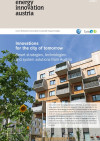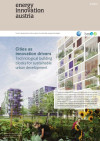Suchergebnisse für "Factsheet: Energietechnologien gestalten, die für alle sinnvoll und nutzbar sind"
Innovations for the city of tomorrow

Smart strategies, technologies and system solutions from Austria
energy innovation austria
4/2016
Herausgeber: BMVIT und Klima- und Energiefonds
Englisch, 16 Seiten
Downloads zur Publikation
Syn[En]ergy: Development of Potential Synergy Effects between the Interdependency of Urban Planning goals and Photovoltaic Usage on Open Urban Landscapes
Open spaces such as parking lots, brownfields and some categories of recreation areas offer an underutilised potential for photovoltaics in urban regions. In the course of Syn[En]ergy an inter- and transdisciplinary approach potential synergies and conflicts with other use demands were investigated, a typology and practical solutions for selected areas with regard to requirements from economy, urban planning and design, legal as well social aspects developed, and then evaluated by stakeholders from enterprises, administration and the general public.
KlimaStadtLinz2030: Linz and its path to climate neutrality by 2030 - Preparation for the EU - Mission “100 Climate-neutral Cities by 2030”
The research project investigates whether and how it is possible for the city of Linz to achieve climate neutrality by 2030 within its own sphere of influence. A common vision, which is being developed with the citizens in a participatory manner, unites the opportunities that arise for the city through the measures necessary for this goal.
Cities as innovation drivers

Technological building blocks for sustainable urban development
energy innovation austria
4/2013
Herausgeber: BMVIT, Klima- und Energiefonds
Englisch, 8 Seiten
Downloads zur Publikation
MehrWertStrom 2030 - PV-Community system - Exploring a participatory pilot project with regional added value for structurally weak regions
The "MehrWertStrom 2030" project analysed the legal, technical, organizational and economic feasibility of PV community joint venture facilities on multi-party buildings including the added value for structurally weak regions and developed innovative solutions related to organization, financing and realization.
SmartQ+ Bruck/Leitha - Energy saving potentials through neighbourhood and community planning
First-time linking of transport and energy simulation models for municipal planning in order to visualise (energy) saving potentials in settlement development and effects of planning projects on mobility demand and the energy network of a municipality in an interactive visualisation.
VERTICAL FARMING - Investigation on requirements of a Vertical Farm-prototype development for crop plant production
In the center of interest stands the investigation of fundamental principles for a new building typology – the Vertical Farm. Urban vertical food production can contribute to more energy efficient cities by concurrently reducing land use. Substantial influencing factors to achieve these goals are intended to be revealed.
F4WM - Fit4WienerMission
Preparation for the EU Urban Mission by updating goals and strategies (Smart City Wien Framework strategy, Climate-Roadmap), developing a manual for climate-neutral Viennese neighbourhoods and concepts for the participation of citizens (Climate Citizens' Council) and businesses (Climate Agreements), as well as a city-internal capacity and structural planning.
Spatial Energy Planning for Smart City Quarters and Smart Regions
In the project ERP_hoch3 energy related policy research in three Austrian agglomerations (Vienna – Lower Austria, Graz – Styria and Vorderland-Feldkirch) has been done, scenarios of the current state and the target state have been modelled and calculated. The aim was to develop generic transferable recommendations for spatial energy planning in agglomerations.
Future Quarter - Way to an energy-plus quarter in Vienna
Development of transferable concepts for energy-plus quarters as substantial preparatory work for the implementation of an energy showcase quarter in Vienna based on six concrete areas. The support for the broad application of the concept shall be a precursor for the realisation of future energy showcase quarters in Vienna and other cities.
SURO - The urban underground as mine? Potential of secondary resources in subsurface infrastructure systems
Feasibility of a resource cadaster to inventorize, characterize and locate material stocks in subsurface infrastructure networks. The results are used for the economic assessment of secondary resource potentials.
CiQuSo - City Quarters with optimised solar hybrid heating and cooling systems
The project CiQuSo aimed to develop, evaluate and optimize concepts for solar energy systems to provide energy for buildings and cities. The applicability of the developed methods and concepts were shown as an example at Itzling, a part of Salzburg city.
TFlex - Temperature-flexibilisation in low-load operation of local district heating systems
Within the research project TFlex it was checked if the losses adherent to small district heating networks during low-load periods can be reduced. One possible solution is by deactivating the network and supplying the customers from previously charged decentralized storages. The optimal clustering of the storages and the possibility of solar-charging the storage were calculated with the aim of a guaranteed one-hundred percent heat supply.
G2G – Innovation axis Graz-Gleisdorf
Development of testbeds and demonstration zones within already designated areas for urban development along the Graz-Gleisdorf Innovation-Axis with a focus on energy, integrated building technology, smart city-spaces, compact settlement structures, generational living, and ‘cities of short ways’. It will pay specific attention to intermodal mobility as well as ICT-based solutions.
DIM4Energy - Digital Information Models for the Planning and Optimization of Buildings and Urban Energy Infrastructure
Digital information models (DIM) are playing an increasingly important role in urban planning and decision-making processes, from individual buildings (BIM) to urban information models (UIM). For the planning and optimal operation of plus-energy neighborhoods, valuable information could be obtained from these existing models, provided the appropriate data sources and associated software tools are properly linked.
CO2 neuBau - The CO2-neutral Construction Site: a Contribution to the Climate Protection by the Austrian Construction Industry
Identification of all direct and indirect CO2, respectively, GHG emissions generated at construction sites. Analysis of the framework conditions and technologies towards demonstrating the options for their control. In parallel, added values, such as cost-benefit advantages of a CO2-neutral construction site, were outlined and quantified.
fit4power2heat
The integration of heat pumps can increase the cost effectiveness of existing heating networks and counter the high costs for the expansion of power grids at the same time. Aim of the project is to develop innovative business models for small and medium municipal heating networks with focus on synergies between heat and power market. Main focus is a heat pump pooling for several heat grids.
ThermoCluster - Heat generation from infrastructure projects and integration into decentralised low-temperature heating and cooling networks for plus-energy districts
Integrative assessment of the geothermal potential of the Brenner base tunnel and the northern portal area, and the subsequent distribution of the heat generated from these sources to the end-consumer in potential plus-energy districts of the city of Innsbruck.
Reallabor 100% renewable energy Waldviertel
Under the motto "Always one step ahead", the aim is to develop a content-related and economic implementation concept for a "Reallabor 100% erneuerbare Energie Waldviertel".
SMARTIES - SMART Innovative Energy Services - Analysis of requirements of smart energy-services
The emerging development of smart grids provides market opportunities for new ICT-based services ("smart value-added services"). Economic and organizational barriers are foreseeable that could affect the establishment of business models and service providers (data formats, connectivity, controllability, etc.). In order to improve the chances especially for new and local actors, SMARTIES proactively tries to eliminate hindrances of innovation.
